City cleans drug lab house
Published 7:30 am Saturday, October 29, 2016

- S. John Collins / Baker City HeraldA clean up contractor found extremely high levels of meth residue at this Baker City home that police said was used as a drug lab.
Tests done at a south Baker City house, which police designated as an illegal drug lab site in February 2015, show methamphetamine residue of up to 500 times the rate the state allows to deem the structure safe to occupy.
“Levels in this house rank as one of the highest that contractor has seen in our 15 years’ experience,” Larry Stone, of the Portland firm A Best Environmental LLC, wrote in his report to Baker City Police Chief Wyn Lohner.
The city has been attempting to get the property owner, David Baggerly, to clean up the former meth lab site at 301 Second St. without success for the past year and a half, Lohner said.
Since Baggerly did not respond, the Baker City Police hired Stone’s company to begin the process by testing the house for methamphetamine contamination.
Stone said his firm hired a third-party company to do the testing. Had his company conducted the tests it would not have been eligible to do the cleanup, he said.
The testing was done by Karl Kunkle, an authorized clandestine drug lab testing professional from Troutdale. Samples were sent to Analytical Chemistry Inc. at Tukwila, Washington.
The results were then mailed to Lohner.
Stone said Oregon cleanup requirements apply to samples testing at 0.50 micrograms per square foot or higher.
Four samples were taken from each square-foot site at Baggerly’s house.
Of the 12 sites sampled, the lowest methamphetamine contamination, 15.500 micrograms per square foot, was found on the floor of a recreational vehicle parked on the property. The highest contamination, 260 micrograms per square foot, was found on the floor of one of the bedrooms.
Stone said the contamination could have come from the manufacture, use or distribution of methamphetamine on the property.
“In a short period you would not expect to be at these levels,” he said. “They indicate persistent exposure.”
Because the structure on the property is a stand-alone house, Stone said he doesn’t believe others in the neighborhood would be endangered by the contamination.
“There are no signs of active dumping,” he said. “There would be no harm to the neighbors per se.”
Stone said meth lab cleanups have declined over the years. Not only has Oregon restricted access to methamphetamine ingredients, but the drug has become more affordable for users, he said.
“In the past we might have 300 a year and now we have five,” he said of the drug lab cleanups.
But the company is still cleaning up properties.
“What happens now is that people suspect — people don’t post the property as unfit, but the purchaser might suspect based on what the neighbors tell them — and may want it tested,” Stone said.
He said some policing authorities do not pursue cleanup because of the cost — King County in the Seattle area, for example.
Oregon law allows cities to clean up properties and then to put a lien on the property and confiscate it if the owners don’t pay the cost.
Stone noted that Baggerly could not pay the $1,450 cost of testing the site and probably would not pay the cleanup cost, which he estimated could cost $30,000 or more.
Jeanie Dexter, the city’s finance director, said Baker City budgets only $6,000 per year to pay for weed abatement and other property cleanup issues. While some property owners repay the abatement costs, others do not.
City Manager Fred Warner Jr. said Thursday that he is still trying to decide what the city’s next step should be.
Warner said the city might consider demolishing the house, which would cost $6,000 to $10,000.
Still, the county would have a claim to the property, which is undergoing foreclosure because of Baggerly’s failure to pay taxes.
County Treasurer/Tax Collector Alice Durflinger said Thursday that Baggerly has not paid taxes on the property for more than four years. The property’s assessed value, including the land and the two-bedroom, 1,568-square-foot house built in 1900, is $45,887, according to Assessor’s Office records. Annual taxes are $755.40.
Baggerly has until Oct. 14, 2017, to redeem the property, Durflinger said. During that time, he cannot sell it. Only Baggerly or a lien holder could redeem the property.
“This is a community problem,” Warner said referring to the cleanup effort. “I want to do it right. At the end of the day, my issue is I want to make sure we can make it safe.”
See more in the Oct. 28, 2016, issue of the Baker City Herald.


